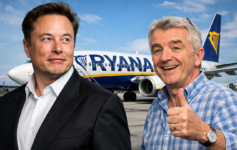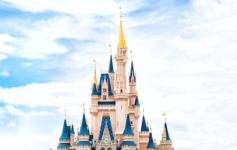Space flight has taken leaps and bounds in the last few years but when will space tourism become a reality?
If you are considering booking travel or signing up for a new credit card please click here. Both support LiveAndLetsFly.com.
If you haven’t followed us on Facebook or Instagram, add us today.
Advances in Space Flight
It seems like SpaceX has just burst onto the scene in the last few years, but the company actually began in 2002. Its goal is to bring down the cost of space travel and enable the colonization of Mars. To that effect, the company has been largely successful in its endeavor.
The cost of a Space Shuttle launch to orbit was estimated at $4bn before its retirement in 2011. Elon Musk, SpaceX founder (among other businesses) equated the high cost to the failure of reusable rocket boosters,
“Imagine if you built a new 747 for every flight.”
Since opening with that simple premise, the industrial giant has not only delivered on re-usable rocket but has them self-land on drone barges in the sea. Resuing the boosters (some approaching ten flights) costs have dropped to a relatively cheap $60 million which includes profit. The goal is to get orbital trips under $10 million, a 99.75% reduction in cost – he still has 1.25% to go.
While SpaceX is the only private spaceflight company to deliver live astronauts to and from the space station, its crew dragon spacecraft won’t be alone for long. Competitors are lining up to compete including Boeing and Lockheed.
Virgin Galactic has been prepping for sub-orbital flights for many years as well, albeit with a different approach. Instead of launching in a traditional rocket from land, a rocket-powered spacecraft is released from the belly of an earthbound aircraft flown to 50,000 feet. Customers for Virgin Galactic will spend five weightless minutes on the precipice of Earth’s orbit barely reaching space before returning home.
Virgin is practically a bargain at $250,000/seat for which the space carrier (?) has already found a bevy of clientele.
Not to be outdone, Jeff Bezos secretly started a competing private company to SpaceX called “Blue Origin.” Far more private, and arguably less successful, the company’s Shepard rocket and New Glenn appear to be on track to give SpaceX a run for its money.
Space Tourism
None of the aforementioned companies invented the space tourism industry. Dennis Tito flew with MirCorp in 2001 for a reported $20 million and spent nearly eight days aboard the international space station (ISS.) Six others followed his lead since.
Becoming a space tourist, outside of Virgin Galactic’s offering, will still be reserved for the ultra-rich. A Japanese billionaire has secured a ride on a “moon loop” trip for himself and 100 of his closest friends for an undisclosed amount. This trip – which looks spectacular – would utilize SpaceX’s new StarShip model, a massive 300′ tall mega rocket still in development. In order to hit his 2023 boarding time, SpaceX is going to first have to learn to stick the landing.
Space adventures don’t have to be limited to flights. One company believes they can begin hosting guests in a four-person space hotel as soon as 2027 for a cost of $9.5MM including transportation.
Reality vs. Hope
Virgin Galactic seems to be the front runner as a legitimate space tourism company for two reasons, achievability, and cost. The company has already sold 600 seats for upcoming flights. However, the company (publicly traded under SPCE) has also had a number of setbacks.
In 2014, during a test flight over New Mexico, a Virgin Galactic pilot was killed when he released a navigational device too quickly. The other pilot survived. Just this month following a three-year hiatus in powered flight, a Virgin Galactic vessel failed to ignite its rocket, a devastating blow to the burgeoning program.
SpaceX might be closer to safe flights sooner, given the hundreds they have now flown and safely landed completely autonomously. However, its use of rockets will still mean very expensive flights for the foreseeable future, even for the top 1%.
SpaceX initially aimed very high for its goals and failed to deliver on many of them. But 2020 was different. The company delivered and retrieved live astronauts, launched 26 times (every two weeks on average), put its own array of communications satellites into the sky providing high-speed internet to rural customers, and tested its Starship 8 prototype.
The reality of spaceflight is that it is still very hard and very expensive. SpaceX and others are delivering some hope that it won’t always be for the extremely elite.
Putting tourists into space by 2023 might be lofty, but that’s how Musk likes it. And frankly, I think he can pull it off.
Conclusion
Space tourism has been the dream of many before it was even a possibility. Now that space travel is becoming less expensive and safer, requiring less and less human involvement, tourism could become a reality in the next few years. Virgin’s continued struggle tempers my optimism that reasonably priced, short-term space tourism is a possibility – but if and when they are successful – competitors will rise and bring down the cost to a level we might all be able to consider.
What do you think? When do you think space tourism will become a reality? Will it ever? Who will win the new space race?




“… under $10 million, a 99.75% reduction in cost – he still has 1.25% to go.”
Did you mean 0.25%?
No, Adil, let me clarify. He’s so far reduced the cost to $60MM of the Space Shuttle’s $4bn price stage per launch, a reduction of 98.5%. But his mission is to get it down to $10MM, which would be a reduction of 99.75% of Space Shuttle launch costs. Therefore he has another 1.25% to go to achieve his goal.
We need to educate anti science, religious nutjobs that hold on to racist views under the guise of capitalism. Yup i am taking about the party that gets on its knees and kisses the orange ass on his ass.
We have too many lawyers and pastors and not enough scientists and mathematicians. Time to make churches pay income taxes and stop being free loaders.
There’s a risk of death that’s not insignificant. Someday, it could be very rare. One astronaut said he was nervous thinking that he was strapped to an explosive rocket built by NASA’S lowest bidder.
Currently, there are planes that you can book a near zero gravity ride and are safe (A300, 727)